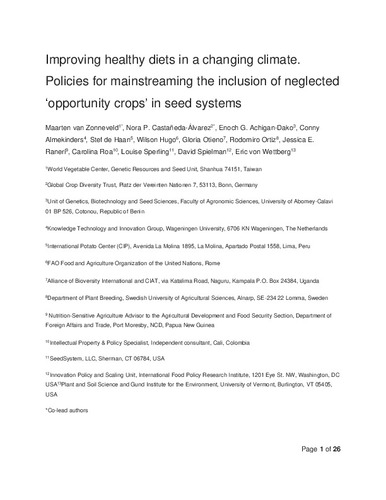Improving healthy diets in a changing climate. Policies for mainstreaming the inclusion of neglected ‘opportunity crops’ in seed systems

Descargar
Fecha de inicio / Fecha de emisión
[2024}Palabras clave
Therapeutic dietsClimate change
Crops
Seed systems
Nutrition
Seed quality
Breeding
Policies
Tipo
DraftTipo
PoliciesMetadatos
Mostrar el registro completo del ítemDescripción
Executive summary Food insecurity and malnutrition undermine human health, livelihoods, and aspirations. In 2023, 2.8 billion people, more than a third of the world’s population, could not afford a healthy diet, while 733 million were chronically undernourished (FAO et al., 2024). In addition, diet-related health costs could surpass US$1.3 trillion per year by 2030 (FAO et al., 2020). Climate change further exacerbates the problem of achieving zero hunger. Promoting the production of a wide range of fruits, vegetables, roots and tubers, nuts, oil crops, pulses, and grains enables a nutritious food supply for healthy diets with crops from different food groups that complement each other in nutritional content. Many of these are called ‘neglected,’ ‘underutilized,’ or ‘orphan’ crops and are adapted to harsh environmental conditions. Many are rich in micronutrients, produce in off-seasons, and are strongly connected to local customs and traditions (van Zonneveld et al., 2023). Supporting healthy diets in a changing climate has led these to be called ‘opportunity crops’ because while neglected in agricultural research and development, and suffering from underinvestment, they have a huge unrealized potential to improve food and nutrition security in the context of climate change (Fredenberg et al., 2024). Unfortunately, limited access to quality seed for these crops is a major bottleneck to more widespread production, as the existing policy environment does not currently support farmers to broaden their crop portfolio (McMullin et al., 2021).
Idioma:
English
Colecciones:
CIMMYT manages Intellectual Assets as International Public Goods. The user is free to download, print, store and share this work. In case you want to translate or create any other derivative work and share or distribute such translation/derivative work, please contact CIMMYT-Knowledge-Center@cgiar.org indicating the work you want to use and the kind of use you intend; CIMMYT will contact you with the suitable license for that purpose
